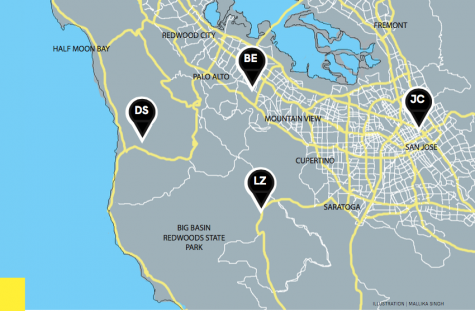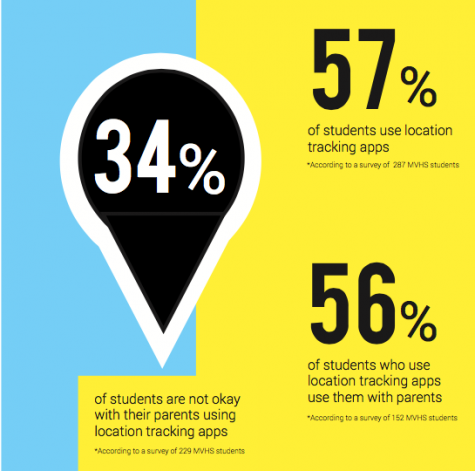Mapped
Location tracking apps are intrusive and break trust in relationships
May 23, 2018
 We have certain established expectations when it comes to privacy. For example, we expect privacy when we are alone, when we’re on the phone and when we’re at home. On a day to day basis, these expectations are seemingly met. The problem, however, starts when our expected privacy is taken away. And we have technology to thank for that — specifically, the apps on our phones. We now have apps for studying, cooking, dating and countless other activities. One app in particular, Life360, takes technology’s presence in our lives to the extreme. Imagine an app on your phone that tracks where you go, how fast you’re going and when you leave or enter certain locations. That is the basis of Life360.
We have certain established expectations when it comes to privacy. For example, we expect privacy when we are alone, when we’re on the phone and when we’re at home. On a day to day basis, these expectations are seemingly met. The problem, however, starts when our expected privacy is taken away. And we have technology to thank for that — specifically, the apps on our phones. We now have apps for studying, cooking, dating and countless other activities. One app in particular, Life360, takes technology’s presence in our lives to the extreme. Imagine an app on your phone that tracks where you go, how fast you’re going and when you leave or enter certain locations. That is the basis of Life360.
Life360 allows users to create several circles for their family or different friend groups and then view the location of others in their group on a real-time map. They can also set notifications for when a user arrives or leaves school, work or home. With the rise of apps that have these features, parents also have a new way to monitor their children 24/7.
The instinctive reaction among teenagers when hearing about these sort of apps is one of indignation. It’s too easy to imagine a situation in which overbearing parents use these apps to take the art of micromanaging their children to the next level. Of course, the more rational, reasonable side of using the app is that parents can keep track of their children for safety purposes. But the boundary between safety and intrusiveness is a thin line to tread, especially when taking different family dynamics into consideration.
It starts with this vicious cycle: if our parents want to install these apps on our phones, it is easy to jump to the conclusion that they don’t trust us. After all, if they feel the need to keep track of where we are at all times, outside of using it for safety purposes (which is possible to do with less invasive apps like Find My iPhone), it’s synonymous to them saying that they don’t trust us to tell the truth about where we are. It seems like they don’t believe we can make responsible choices or stay out of trouble without their constant supervision. Naturally, this can get frustrating.
 At the same time, if we refuse to download these apps or seem opposed to the idea, our refusal simply gives them more reason to distrust us. In their eyes, our refusal only emphasizes the need to download apps like Life360. It seems that there’s no way to win and that it only harms both sides.
At the same time, if we refuse to download these apps or seem opposed to the idea, our refusal simply gives them more reason to distrust us. In their eyes, our refusal only emphasizes the need to download apps like Life360. It seems that there’s no way to win and that it only harms both sides.
However, it’s important to realize that if the relationship between parent and child were built upon trust, the situation above could be avoided. The foundation of a healthy relationship should be established to prevent these situations.
It is our responsibility to communicate with our parents and let them know where we are. Simply texting our parents we’re staying after school to make up a test or that we’re getting food with friends can reassure them, rather than not coming home without telling them beforehand. This way, our parents won’t feel as much of a need to use apps like Life360.
This establishes a balance between allowing kids to have freedom and addressing our parents’ safety concerns. Open communication also lessens our parents’ worries and strengthens our relationships with them. If we form this strong relationship to begin with and establish this initial trust, they’re more likely to allow us more freedom.
However, it is important to recognize that a healthy relationship isn’t always possible. There certainly will be parents who will do everything they can to manage their child’s whereabouts, crossing the line into the extreme. This being said, there are also kids who will continually break whatever rules are set — which only traps us back in the vicious cycle.
This is why the exchange of trust must be mutual. If we choose to break that trust by consistently lying about where we are or sneaking out without permission, we’re only justifying our parents’ concerns. On the other hand, if our parents break that trust and continue to track us, regardless of if we regularly update them on our whereabouts, it feels like this trust isn’t mutual at all.
If we’ve shown that we can be trusted, through regular and honest communication, it’s then on our parents to reciprocate that and allow us a certain amount of freedom. It is excessive and invasive for parents to constantly track and receive notifications about their children’s location because this harms a relationship that should have originally been built upon trust.
We also have to acknowledge that Life360 takes invasion of privacy to another level. There are various other apps like Find My iPhone or Find Friends that don’t actively send notifications and updates to users of the app. While Life360 does only send these notifications if a user sets them, it makes these options available. In the case of other apps like Find My iPhone and Find Friends, it is only when a parent actively opens the app to check on their child that they will they receive information about their location.
Especially in the age of online connectivity, when our data no longer feels private, it’s chilling to think that on the other side of some obscure screen, people are watching our every move: what we like on Facebook, our Google searches, our recent purchases. The least our parents can do is make us feel safe and free to make our own choices, not like we’re being constantly watched.
In addition, it’s inevitable that there will come a time when our parents can no longer watch over us. We should start developing that freedom now so we can develop a habit of taking responsibility for our choices. Unless there’s reason to believe that we’re in danger, it is best for parents to take a step back and let us take our own paths.



















